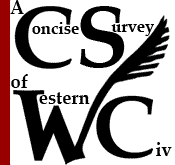Primary Sources for Chapter 10
Liberation of Mind and Body: Early Modern Europe, 1543 to 1815
Study Guide| Art History | Links
Abjuration of Galileo: the astronomer surrenders to the accusations of the Inquisition.
Content Question: To what specifically does Galileo plead guilty?
Analysis Question: How would his promises about future behavior satisfy the Church authorities?
Evaluative Question: How should the maintenance of authority be balanced against the pursuit of knowledge?
From the Salons to the Streets
Voltaire on Tolerance: an article from his Philosophical Dictionary wrestles with the causes of and means toward religious toleration.
Content Question: According to Voltaire, what are the causes for intolerance and persecution?
Analysis Question: What distinctions does Voltaire make between individual and state-sponsored actions?
Evaluative Question: How achieveable are Voltaire's solutions toward more tolerance?
Links to the rest of Voltaire’s Philosophical Dictionary are here.
Other Sources
Letters by Lady Mary Wortley Montagu: links to various editions collecting the correspondence of an English observer in the 17th century. An online versions here and here.
The Behavior of Louis XIV: the Duc de Saint-simon offers his views of the monarch.
Content Question: What are the strengths and weaknesses of Louis XIV according to Saint-simon?
Analysis Question: How do Louis XIV’s court and life reflect the mechanisms of power for absolute monarchy?
Evaluative Questions: What would be the long-term challenges of absolute monarchy given Louis XIV’s methods? How does Louis compare and contrast with other rulers (e.g. Hammurabi, Cyrus, Julius Cæsar, Augustus, Charlemagne, William “the Conqueror,” or Napoleon (below))?
The full text of Saint-simon’s Memoirs is available here.
The Declaration of Independence: The official explanation for the Americans’ separation from Great Britain.
Content Question: What are the key complaints about British tyranny?
Analysis Question: How is the Declaration designed to gain sympathy from intellectuals of the Enlightenment?
Evaluative Questions: Given how the British government actually worked, how legitimate is it for the Americans to blame the king? How much in the document is propaganda rather than fact?
The Declaration of Liberty, Equality, and Fraternity
Declaration of the Rights of Man and the Citizen: The foundational document of French liberties.
Content Question: What are the main propositions of this declaration?
Analysis Question: How are these rules similar to the American Bill of Rights?
Evaluative Question: How do these laws reflect the ideals of the Enlightenment?
Other Sources:
For a view from the opposite sex, see Declaration of the Rights of Woman and the Citizeness? How does it compare to the "Man's" version?
Liberté, Égalité, Fraternité, exploring the French Revolution: sources and essays.
"What is the Third Estate?" by Abbé Sieyes or here: a member of the first estate declares his support for the third.
Hanover History Texts: The French Revolution
The Levée en Masse: a call to the radical defense of France as it was being invaded by foreign armies.
Content Question: What do French leaders call for different groups to do?
Analysis Question: How would these commands motivate the people?
Evaluative Question: How does this call harness new forces for the regime?
Napoleon’s Report on the Condition of France: The new emperor sums up what he has accomplished.
Content Question: What are the most important accomplishments listed here?
Analysis Question: How do these reflect the virtues of the Enlightenment?
Evaluative Question: How do these claims compare and contrast with other rulers (e.g. Hammurabi, Cyrus, Julius Cæsar, Augustus, Charlemagne, William “the Conqueror,” or Louis XIV)?
Other Sources:
First-hand descriptions of Napoleon: eyewitness descriptions of the French leader.
The War Times Journal: Napoleonic Era: many letters, reports, and dispatches from commanders.
Primary Source Project Links
10. Declaration of the Rights of Man versus Declaration of the Rights of Woman
10a. Parliament versus King Charles I of England about Monarchy



